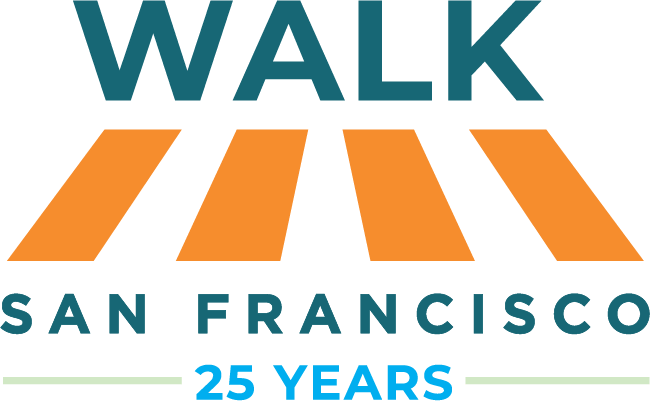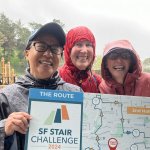Books, podcasts, and movies to help you navigate grief
This is a guest post by Hannah Ege, whose husband Sheria Musyoka was hit and killed by a driver in San Francisco. After losing Sheria, Hannah and son Theo relocated to Philadelphia where they are rebuilding their lives and honoring Sheria’s legacy. Hannah is a writer, teacher, advocate, and parent. Hannah writes educational content as well as poetry, non-fiction, and fiction. Hannah is part of the Families for Safe Streets community.
I have been widowed for three years now. On the morning of February 4th, 2021, my husband Sheria, lost his life as a pedestrian to a reckless, speeding driver.
I am a profoundly different person than I was before this trauma.
Living with trauma and grief can be debilitating, and often feels lonely and isolating. This certainly was true for me as my family and I had just relocated to San Francisco, mere days before the crash. I had no community in San Francisco, and in the months of change that followed the crash, this became even more apparent.
As I relocated my son and I back to the East Coast, I found myself searching for every type of resource I could find – from movies, to podcasts, to books and more – that tackled the realities of grief, loss and heartache. I needed to feel less alone and needed help processing this unimaginable loss.
I have shared some of the children’s books about loss that have helped my son, and two television shows that helped me feel seen and sane.
Here I share a new collection of films, books and podcast shows I checked out, that may help you find comfort and community within your grief.
Film: Good Grief
Good Grief will have you laughing and crying as it takes you on a rollercoaster ride of life after death. Living the seemingly perfect fairytale life, the film starts off by depicting a beautiful couple who have built a life together and are enjoying their marriage, and their community. This ‘Happily Ever After’ beginning is quickly shattered when Marc’s husband is hit and killed in a traffic crash right outside their New York apartment.
I want to warn although the crash scene itself is not depicted, you do see Marc run towards the crash in a heart wrenching realization that it is his husband’s cab. As a surviving spouse of a pedestrian hit-and-run, this scene was gut wrenching for me, having seen my own husband’s crash scene.
The remainder of the film focuses on all the unpredictable and wild changes and transformations that can happen after death, but those first few minutes may be too intense to watch for those who have experienced a loss or injury in a traffic crash.
Seeing Marc’s journey after loss is very well-depicted, portraying the wide and vast experiences we can go through while navigating grief. Marc learns things about his husband that are confusing and contradicting to the truth Marc believed he knew when his husband was alive. Marc has to deal with the reality of processing information about his husband, without his husband there to give context or closure.
Marc also is navigating long standing friendships, while developing new relationships and connections that open him and challenge the way he’s been limiting himself. Marc’s friends struggle with their own grief while also realizing the way grief impacts their friendship with Marc. Nothing is left untouched after loss, and everything must morph and change as people live with grief and the absence of someone dear. I felt so understood and seen while watching these dynamics play out on the screen, as there were so many changes and shifts that happened in who I consider my community after the loss of my husband.
Although this film had its hard scenes, it is an excellent depiction of how messy and non-linear a grief journey can be.
Film: Sitting in Bars with Cake
This film follows a very different trajectory than Good Grief, although it certainly contains similar complexities around grief, love, and loss. Rather than a sudden death at the start of the movie, we witness a long, drawn out and gut wrenching sickness that leads to an inevitable death. This movie brings up so many important yet intimidating questions. What is the meaning of life? How does one live while watching another die? How do we live each day as if it is our last?
This film follows the stories of two childhood best friends who are now navigating life as adults, when one of them discovers she has untreatable brain cancer. While dealing with the shock, grief and despair that comes with such news, the two friends must lean on each other all the more for support, love and care. Together, they continue a tradition of making cakes and eating them in bars as a means to connect with strangers and spread joy and love, despite the ever-looming countdown that started with a diagnosis.
Although we all know that death is each of our inevitable ends, we often don’t allow our daily living to be shaped by that truth. We get so caught up in the details of existence, that we so often don’t slow down enough to appreciate the small moments that give life so much meaning. Sitting in Bars with Cake will have you realizing the precious moments life gives us each day and will inspire you to reach out to your loved ones.
Podcast: All There Is with Anderson Cooper
All There Is with Anderson Cooper explores “the people we lose, the people left behind, and how we can live on – with loss and with love.”
With different experts, celebrities, thinkers and ordinary people making extraordinary change through grief, Cooper gives us a conversational podcast that shares stories, ideas, hope and comfort for all those who have been through a significant loss.
Each conversation has different dynamics and tone, but the ever-present query being explored is how grief has changed you to live in the present. Guests share about their loved ones, their loss and how one can continue to wake up each day after death to choose life and love.
Each conversation holds nuggets of wisdom and comfort in solidarity that grief is an ever present companion for so many of us. It is so easy to feel alone in grief, but Cooper’s podcast has given me community with so many people I will never meet, simply because of our shared understanding of life with grief, and the way we have allowed grief to move through us and change us.
Podcast: Grief Is A Sneaky Bitch with Lisa Keefauver
With years of being a social worker under her belt, Lisa hosts outstanding conversations on her podcast about love, loss and living with grief. From collective experiences like the COVID-19 pandemic, to personal losses, Lisa aims to address the way we approach death and grief as an American culture and seeks to reclaim the significance of death rituals.
Lisa brings experts onto the show, as well as everyday workers who are living with grief, to have conversations about the way we make room for grief within our homes, workplaces and community gatherings. We have lost so many of our collective grief rituals and society often thinks a three-day bereavement leave from work should be enough to mourn and move on from death. Lisa strives to acknowledge this reality we live with, while giving people the room to share how they handle death and grief while living in a capitalist society that demands our time and labor.
Lisa and her guests offer up alternative ways we can face death in our communities, allowing room for all the messy and chaotic ways loss can impact your personal life.
Book: Grief, Day by Day: Simple Practices and Daily Guidance for Living with Loss by Jan Warner
If you are someone who enjoys and benefits from small doses of insight and reflection on a regular basis, then consider getting Grief, Day by Day by Jan Warner. This thoughtful book gives you a daily quote, thought, and probe. The days are not numbered or dated or follow any particular order in topic, making it perfect for opening at random, casual use, or even a daily practice for a year.
Each entry will have you thinking about an aspect of grief and your response to it, or will guide you to identify the ways grief is impacting you in the current moment. Warner also includes thoughtful prompts that help you remember your loved one and help you share their memories with others.
Warner wrote this daily guide several years after losing her own husband of 15+ years, but her questions and prompts are inclusive to people who do not have such extensive histories. She often shares her own experience with navigating grief and asks thought provoking questions that will challenge you to sit with your own experience of grief. Warner acknowledges that grief is not a linear process that can be worked through in set stages, but rather a fluid understanding and reckoning within yourself that will forever accompany you in life.
Book: What Happened To You? Conversations on Trauma, Resilience, and Healing by Oprah Winfrey and Bruce D. Perry
Although this book does not exclusively focus on grief, Dr. Perry and Oprah walk you through a wide range of topics related to trauma and give well founded research and advice on healing from trauma and building resilience.
Dr. Perry brings his expertise as a brain and trauma expert, while Oprah brings her own personal story and the stories she has witnessed in her iconic role as a talk host. Together, these two help explain behavior patterns of trauma survivors, while giving hope and healing in the resources and tools they offer for those living with PTSD or C-PTSD (Complex Post Traumatic Stress Disorder).
Trauma is real, and survivors often live with grief and PTSD in some form or another, especially when their loved one was taken in a crash.
As the surviving spouse of someone who was killed in a horrific traffic crash, I had severe PTSD for the first two years after Sheria’s death. I found myself having panic attacks often when in cars, would get startled at large sounds and would have full blown meltdowns when loved ones did not pick up their phone, fearing that they must be dead.
Reading the stories that Oprah and Dr. Perry share helped me understand my symptoms, while also empowering me to recognize the way PTSD had been shaping my life long before losing my husband. Childhood trauma is often overlooked and goes unrecognized when it is your baseline for normal. Sheria was the first person in my life who gave me insight that my childhood was far from normal. He was the anchor that held me down as I navigated the murky memories of my childhood, assuring me of my worthiness for care and loving me deeply in my pain. Losing him opened up the floodgates and the first year after his death was a blur as I dealt with debilitating PTSD symptoms from both his loss and the realization that I was alone yet again while facing my demons.
Reading Oprah’s and Dr. Perry’s conversation helped me find the tools I was missing to accept that which I could not change, while also supporting me in naming and recognizing my trauma and find the healing and power I now get to reclaim as an adult.
Are you someone who has been personally and directly affected by a traffic crash? Learn more about San Francisco Bay Area Families for Safe Streets.




